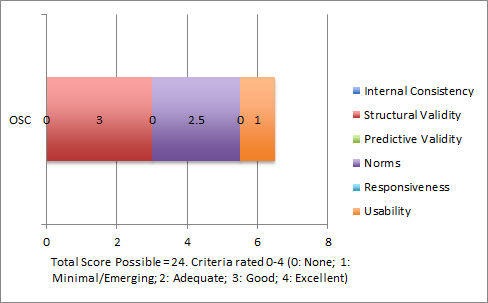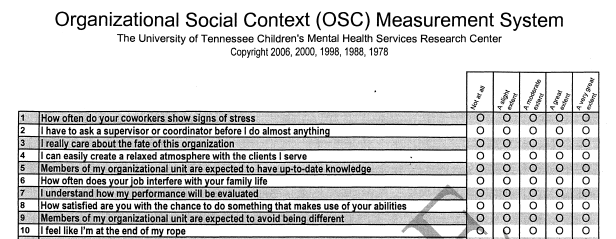Relevant Literature:
- Aarons, G. A., Glisson, C., Green, P. D., Hoagwood, K., Kelleher, K. J., Landsverk, J. A. (2012). The organizational social context of mental health services and clinician attitudes toward evidence-based practice: a United States national study. Implementation Science, 7(1), 56. doi:10.1186/1748-5908-7-56
- Cassie, K. M., & Cassie, W. E. (2012). Organizational and individual conditions associated with depressive symptoms among nursing home residents over time. The Gerontologist, 52(6), 812–821. doi:10.1093/geront/gns059
- Cohen-Callow, A., Hopkins, K. M., & Kim, H. J. (2009). Retaining workers approaching retirement: why child welfare needs to pay attention to the aging workforce. Child Welfare, 88(5), 209–228.
- Courtney Cronley, D. A. P. (2010). How Well Does It Fit? An Organizational Culture Approach to Assessing Technology Use Among Homeless Service Providers. Administration in Social Work, 34, 286–303. doi:10.1080/03643107.2010.481194
- Glisson, C. (2007). Assessing and Changing Organizational Culture and Climate for Effective Services. Research on Social Work Practice, 17(6), 736–747. doi:10.1177/1049731507301659
- Glisson, C., Landsverk, J., Schoenwald, S., Kelleher, K., Hoagwood, K. E., Mayberg, S., … Research Network on Youth Mental Health. (2008). Assessing the organizational social context (OSC) of mental health services: implications for research and practice. Administration and Policy in Mental Health, 35(1-2), 98–113. doi:10.1007/s10488-007-0148-5
- Glisson, C., Schoenwald, S. K., Kelleher, K., Landsverk, J., Hoagwood, K. E., Mayberg, S., … Research Network on Youth Mental Health. (2008). Therapist turnover and new program sustainability in mental health clinics as a function of organizational culture, climate, and service structure. Administration and Policy in Mental Health, 35(1-2), 124–133. doi:10.1007/s10488-007-0152-9
- Hopkins, K. M., Cohen-Callow, A., Kim, H. J., & Hwang, J. (2010). Beyond intent to leave: Using multiple outcome measures for assessing turnover in child welfare. Children and Youth Services Review, 32(10), 1380–1387. doi:10.1016/j.childyouth.2010.06.006
- PATTERSON, D. A., WOLF (ADELV UNEGV WAYA), S., MAGUIN, E., DULMUS, C. N., & NISBET, B. C. (2011). Measuring a Community-Based Mental Health Organization’s Culture and Climate Scores Stability. Social Work in Mental Health, 9(6), 435–444. doi:10.1080/15332985.2011.575720
- Rostila, I., Suominen, T., Asikainen, P., & Green, P. (2011). Differentiation of organizational climate and culture in public health and social services in Finland. Journal of Public Health, 19(1), 39–47. doi:10.1007/s10389-010-0353-7
|


